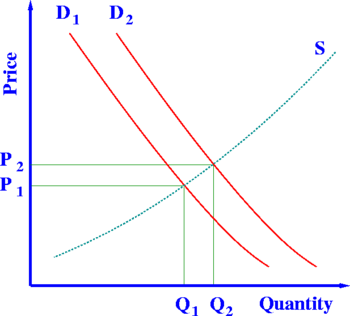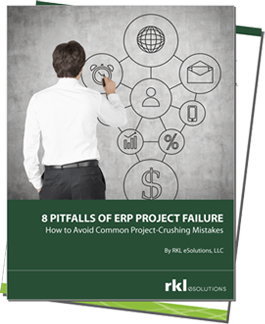
This supply and demand model shows how prices vary because of a balance between the availability of a product and the demand for it. The graph shows an increase in demand from D1 to D2 with the resulting increase in price and the amount needed to reach a new balance point on the supply curve (S). (Photo credit: Wikipedia)
It’s a recognized truism that forecasts are always wrong. They are especially wrong when forecasts must be narrowed to a single number to be made useful.
A statistical forecast should be stated as a number followed by a plus and minus range. For example, one might say: “This model forecasts demand for next month to be 12,816 units, plus or minus 3,018 units.”
That would mean that the statistical model employed can predict with reasonable certainty that demand for next month would fall in the range between 9,798 units and 15,834 units.
However, to be useful for planning production or other actions, that range really needs to be narrowed to a single number—how many to make or how many to have on-hand to meet the demand.
The problem is that the single number we choose is almost always going to be wrong—we just don’t know by how much it’s going to be wrong.
So, let’s take a semi-humorous look at just how wrong various “experts” might be in making forecasts about the future.
“Computers in the future may weigh no more than one-and-a-half tons.” [1]
This was a prediction made by Popular Mechanics magazine’s team of expert prognosticators back in 1949. They were right, of course. It is certainly true that computers today “weigh no more than one-and-a-half tons.”
But being right in this vein is somewhat like forecasting that “sales will be more than 100,000 units” only to discover that sales are more than 10 million units.
“I think there is a world market for maybe five computers.” [2]
Here is the wise speaking of founder and then chairman of industry-leading International Business Machines (IBM), Thomas Watson, in 1943. Is it any wonder that they barely made a noticeable dent in the personal computer (PC) market and were dramatically overshadowed by other PC manufacturers like Apple Computer, Dell Computers and dozens of others?
“The concept is interesting and well-formed, but in order to earn better than a ‘C,’ the idea must be feasible.” [3]
When Fred Smith presented his paper outlining the concept that was to become “FedEx” to his Yale University professor, this was the professor’s response. This business “expert” apparently forecast that the demand for a reliable overnight delivery service would not support a firm and make it profitable.
Wrong! by a wide margin, I should say.
“Who the hell wants to hear actors talk?” [4]
Harry Warner, one of the Warner Brothers, didn’t think there was a market for “talking pictures.” In 1925, Harry’s brother, Sam, wanted to introduce “talkies,” while Harry opposed this move. The studio had lost nearly $350,000 ($4.6 million in today’s dollars) by February 1926, so Harry relented.
Harry’s forecast was off.
“We don’t like their sound, and guitar music is on the way out.” [5]
Decca Recording Company’s executives forecast a very limited market for the Beatle’s sound and, apparently, guitar music in general, back in 1962. They missed their big opportunity.
“Heavier-than-air flying machines are impossible.” [6]
There is a great danger to innovation any time we come to the conclusion that anything is “impossible.” The brilliant scientist, Lord Kelvin, was beaten by two bicycle guys who changed the world.
“So we went to Atari and said, ‘Hey, we’ve got this amazing thing, even built with some of your parts, and what do you think of funding us? Or, we’ll give it to you. We just want to do it. Pay our salary, we’ll come work for you.’ And they said, ‘No.’ So then, we went to Hewlett-Packard, and they said, ‘Hey, we don’t need you. You haven’t gotten through college yet.’” [7]
The short-sighted executives at Atari (whatever happened to Atari?) and Hewlett-Packard (still trying to find itself in some respects) turned down Apple’s visionary thinkers because their “forecasting” and “innovation” engines were missing badly at the time.
The point is…
The point is this: trying to operate your business or your supply chain based on forecasts is a risky business.
Supply chain agility and fast, flexible and innovative responses to changes in the market will beat attempts to out-guess the market.
The strategic selection and positioning of resources, accompanied by big data, supply chain visibility and becoming customer-driven, are the best ways to secure your company’s future.
We would like to hear from you. Please leave your comments here, or contact us directly if you prefer.
[1] Meigs, James B. "Inside the Future: How PopMech Predicted the Next 110 Years." Popular Mechanics. Popular Mechanics, 10 Dec. 2012. Web. 10 Mar. 2014.
[2] "Thomas J. Watson." Wikipedia. Wikimedia Foundation, n.d. Web. 11 Mar. 2014.
[3] "Fred Smith." Entrepreneur. Entrepreneur (online), 8 Oct. 2008. Web. 09 Mar. 2014.
[4] "Warner Bros." Wikipedia. Wikimedia Foundation, n.d. Web. 11 Mar. 2014.
[5] "The Beatle's Decca Audition." Wikipedia. Wikimedia Foundation, n.d. Web. 11 Mar. 2014.
[6] Weisstein, Eric W. "Kelvin, Lord William Thomson (1824-1907) -- from Eric Weisstein's World of Scientific Biography." Kelvin, Lord William Thomson (1824-1907) -- from Eric Weisstein's World of Scientific Biography. Wolfram Research, n.d. Web. 11 Mar. 2014.
[7] Goldberg, Marty. "The Atari/Apple Connection." The Atari/Apple Connection. Indiana University-Perdue University Indianapolis, n.d. Web. 10 Mar. 2014.




